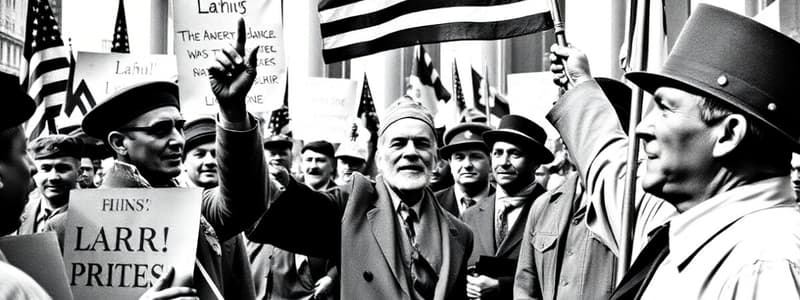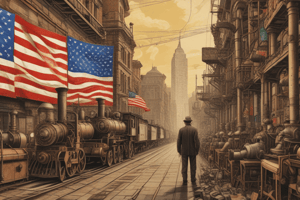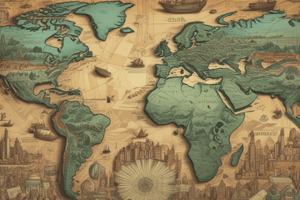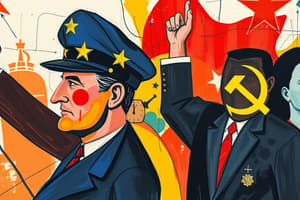Podcast
Questions and Answers
What is a patent?
What is a patent?
- A right granted to an inventor by the government (correct)
- An agreement between companies to fix prices
- A regulation on international trade
- A type of economic system controlled by community ownership
What is the primary characteristic of capitalism?
What is the primary characteristic of capitalism?
- Profit-driven private ownership (correct)
- Community ownership of production
- Focus on social welfare programs
- Government control of trade and industry
What does it mean for the government to be Laissez-faire?
What does it mean for the government to be Laissez-faire?
- The government invests heavily in industry
- The government actively regulates business
- The government imposes strict taxes on businesses
- The government is hands-off regarding business affairs (correct)
How does Horizontal Integration differ from Vertical Integration?
How does Horizontal Integration differ from Vertical Integration?
What is a monopoly?
What is a monopoly?
What is the purpose of forming unions by workers?
What is the purpose of forming unions by workers?
What is Nativism?
What is Nativism?
What is Urbanization?
What is Urbanization?
What was Woodrow Wilson's plan for peace called?
What was Woodrow Wilson's plan for peace called?
How did people in the US generally feel about the Treaty of Versailles?
How did people in the US generally feel about the Treaty of Versailles?
What agreement was reached at the Washington Naval Conference?
What agreement was reached at the Washington Naval Conference?
What did Presidents Harding and Coolidge believe would help boost the economy?
What did Presidents Harding and Coolidge believe would help boost the economy?
What is an installment plan?
What is an installment plan?
What does True Communism theoretically support?
What does True Communism theoretically support?
What effect did the Red Scare have on immigrants and unions?
What effect did the Red Scare have on immigrants and unions?
What characterized the Harlem Renaissance?
What characterized the Harlem Renaissance?
What does the Legislative branch of the U.S. government do?
What does the Legislative branch of the U.S. government do?
What was the significance of the Emancipation Proclamation?
What was the significance of the Emancipation Proclamation?
Which two companies were responsible for building the Transcontinental Railroad?
Which two companies were responsible for building the Transcontinental Railroad?
What did the Homestead Act provide to citizens?
What did the Homestead Act provide to citizens?
What was the main idea behind the doctrine of Manifest Destiny?
What was the main idea behind the doctrine of Manifest Destiny?
What was the primary motivation for the United States to expand its territories during the late 19th century?
What was the primary motivation for the United States to expand its territories during the late 19th century?
Which territory was NOT obtained by the United States following the Spanish-American War?
Which territory was NOT obtained by the United States following the Spanish-American War?
What was a significant consequence of the U.S. involvement in World War I regarding public opinion?
What was a significant consequence of the U.S. involvement in World War I regarding public opinion?
What event triggered the U.S. declaration of war against Spain in 1898?
What event triggered the U.S. declaration of war against Spain in 1898?
Which of the following best describes the Boxer Rebellion?
Which of the following best describes the Boxer Rebellion?
How did farmers respond to the decline in grain prices during the Great Depression?
How did farmers respond to the decline in grain prices during the Great Depression?
What was one major factor that contributed to the Stock Market Crash?
What was one major factor that contributed to the Stock Market Crash?
Which of the following was NOT one of the five main causes of the Great Depression?
Which of the following was NOT one of the five main causes of the Great Depression?
What was a significant consequence of the Dust Bowl?
What was a significant consequence of the Dust Bowl?
What was Hoover's belief regarding government intervention during the economic crisis?
What was Hoover's belief regarding government intervention during the economic crisis?
What was the purpose of Roosevelt's Fireside Chats?
What was the purpose of Roosevelt's Fireside Chats?
What was the primary focus of the Civilian Conservation Corps?
What was the primary focus of the Civilian Conservation Corps?
What was the outcome of the Supreme Court's ruling on many of FDR's policies?
What was the outcome of the Supreme Court's ruling on many of FDR's policies?
What was the primary goal of the Social Gospel Movement?
What was the primary goal of the Social Gospel Movement?
What is the main function of Political Machines?
What is the main function of Political Machines?
What did the Plessy v. Ferguson court case establish?
What did the Plessy v. Ferguson court case establish?
How did W.E.B. DuBois’s approach to racial equality differ from Booker T. Washington's?
How did W.E.B. DuBois’s approach to racial equality differ from Booker T. Washington's?
What was the focus of Teddy Roosevelt's Square Deal?
What was the focus of Teddy Roosevelt's Square Deal?
What was the primary purpose of the Pure Food and Drug Act?
What was the primary purpose of the Pure Food and Drug Act?
What were the beliefs of the Bull Moose Party?
What were the beliefs of the Bull Moose Party?
What is the difference between the Federal Trade Commission and the Federal Reserve System?
What is the difference between the Federal Trade Commission and the Federal Reserve System?
Flashcards
What is a patent?
What is a patent?
Exclusive right granted by the government to an inventor, prohibiting others from making, using, or selling their invention.
What is the difference between Capitalism and Socialism?
What is the difference between Capitalism and Socialism?
A system where private individuals control industries for profit, while Socialism is an economic system where production is regulated by the community or government.
What does it mean if the government is Laissez-faire?
What does it mean if the government is Laissez-faire?
A government policy where the government limits its intervention in the economy, allowing businesses to operate freely.
What is Social Darwinism?
What is Social Darwinism?
Signup and view all the flashcards
What is Horizontal Integration?
What is Horizontal Integration?
Signup and view all the flashcards
What is Vertical Integration?
What is Vertical Integration?
Signup and view all the flashcards
What is a monopoly?
What is a monopoly?
Signup and view all the flashcards
What did workers start forming to try and fight for their rights?
What did workers start forming to try and fight for their rights?
Signup and view all the flashcards
What is Manifest Destiny?
What is Manifest Destiny?
Signup and view all the flashcards
What is Laissez-faire?
What is Laissez-faire?
Signup and view all the flashcards
What is the Bessemer Process?
What is the Bessemer Process?
Signup and view all the flashcards
What is imperialism?
What is imperialism?
Signup and view all the flashcards
Why did the US turn to imperialism?
Why did the US turn to imperialism?
Signup and view all the flashcards
What caused the Spanish-American War?
What caused the Spanish-American War?
Signup and view all the flashcards
What territories did the US gain from Spain?
What territories did the US gain from Spain?
Signup and view all the flashcards
What was the Boxer Rebellion?
What was the Boxer Rebellion?
Signup and view all the flashcards
What were the Fourteen Points?
What were the Fourteen Points?
Signup and view all the flashcards
What was the League of Nations?
What was the League of Nations?
Signup and view all the flashcards
What was the Treaty of Versailles?
What was the Treaty of Versailles?
Signup and view all the flashcards
What is an installment plan?
What is an installment plan?
Signup and view all the flashcards
What was the Red Scare?
What was the Red Scare?
Signup and view all the flashcards
What is Fundamentalism?
What is Fundamentalism?
Signup and view all the flashcards
What was a Flapper?
What was a Flapper?
Signup and view all the flashcards
What was the Social Gospel Movement?
What was the Social Gospel Movement?
Signup and view all the flashcards
What are Political Machines?
What are Political Machines?
Signup and view all the flashcards
What is patronage and graft?
What is patronage and graft?
Signup and view all the flashcards
What was the Progressive Movement?
What was the Progressive Movement?
Signup and view all the flashcards
What were segregation laws?
What were segregation laws?
Signup and view all the flashcards
What is suffrage?
What is suffrage?
Signup and view all the flashcards
What was Teddy Roosevelt's Square Deal?
What was Teddy Roosevelt's Square Deal?
Signup and view all the flashcards
Why was the Pure Food and Drug Act created?
Why was the Pure Food and Drug Act created?
Signup and view all the flashcards
What was the Great Depression?
What was the Great Depression?
Signup and view all the flashcards
What caused the Dust Bowl?
What caused the Dust Bowl?
Signup and view all the flashcards
What was Hoover's approach to the economic crisis?
What was Hoover's approach to the economic crisis?
Signup and view all the flashcards
Who were the Bonus Army?
Who were the Bonus Army?
Signup and view all the flashcards
What was the New Deal?
What was the New Deal?
Signup and view all the flashcards
What were Roosevelt's Fireside Chats?
What were Roosevelt's Fireside Chats?
Signup and view all the flashcards
What did the Civilian Conservation Corps (CCC) do?
What did the Civilian Conservation Corps (CCC) do?
Signup and view all the flashcards
What did the New Deal do to help farmers?
What did the New Deal do to help farmers?
Signup and view all the flashcards
Study Notes
Unit 1 - Early US History Review
- What do each of the three branches of government do?
- Legislative - make laws
- Executive - enforce laws
- Judicial - interprets laws
- What was the main idea of the Monroe Doctrine?
- The US would not interfere in the international affairs of the European nations, and European nations would not interfere in the affairs of the Western Hemisphere.
- What were the two sides of the Civil War, what was each fighting for, and who were their military leaders?
- Union - more industrial, fighting to preserve the Union
- Confederacy - more agricultural, fighting for their independence
- What did the Emancipation Proclamation do?
- Freed slaves in 1863
Unit 2 - Western Expansion
-
What is Manifest Destiny?
-
Belief that America had a divine obligation to stretch their boundaries to the Pacific Ocean
-
What is Forced Assimilation?
-
Giving up one's culture to conform to dominant culture
-
What was Seward's Folly?
-
US purchased Alaska from Russia
-
What was the open range system?
-
American settlers learned to manage herds from Mexican vaqueros
-
What did the Pacific Railway Act do, and what two companies built the Transcontinental Railroad?
-
Government gave thousands of acres of lands to the railroad companies.
-
Union Pacific & Central Pacific
-
What did the Homestead Act do?
-
Gave 160 acres to any citizen who qualified
-
What caused the creation of the Populist party, and what did the Populist party stand for?
-
Farmers' alliances realized they needed more political power to address the economic hardships they were facing.
Unit 3 - Industrialization
- What is the Bessemer Process and why was it important?
- A way to manufacture steel quickly, cheaply, and more durable and flexible.
Studying That Suits You
Use AI to generate personalized quizzes and flashcards to suit your learning preferences.




